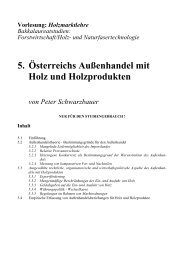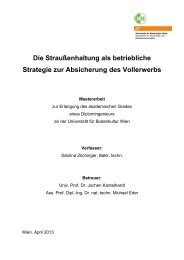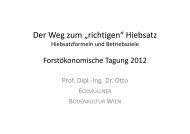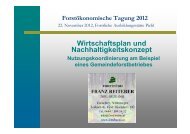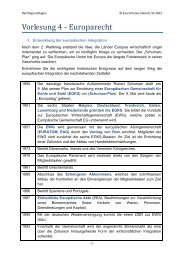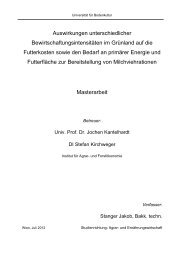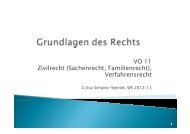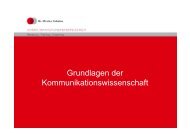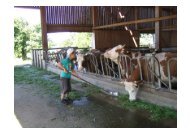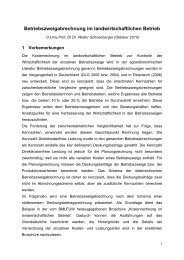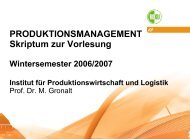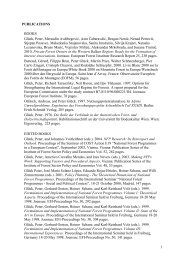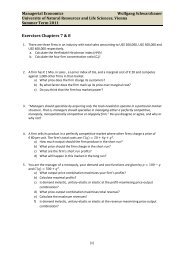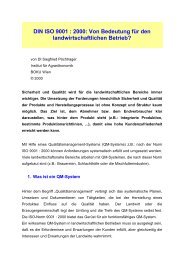Certification and Accreditation of Organics in Austria - Boku
Certification and Accreditation of Organics in Austria - Boku
Certification and Accreditation of Organics in Austria - Boku
You also want an ePaper? Increase the reach of your titles
YUMPU automatically turns print PDFs into web optimized ePapers that Google loves.
14<br />
There are seven accredited certification bodies operat<strong>in</strong>g<br />
<strong>in</strong> <strong>Austria</strong>, which are either non-pr<strong>of</strong>it or forpr<strong>of</strong>it<br />
private organizations. Shares are held by private<br />
citizens, by enterprises that work <strong>in</strong> the <strong>in</strong>spection<br />
bus<strong>in</strong>ess at large, or by organic farmers’ associations.<br />
The <strong>in</strong>spectors visit farms annually <strong>and</strong> processors<br />
several times per year, mostly unannounced.<br />
Inspection <strong>and</strong> certification may be performed by the<br />
same body, but with<strong>in</strong> the body these two steps have<br />
to be adm<strong>in</strong>istered by two different people (<strong>in</strong>spector,<br />
certifier) <strong>in</strong> two dist<strong>in</strong>ct steps. A certificate is granted<br />
by the certification body only if the <strong>in</strong>spection report<br />
is complete <strong>and</strong> plausible, <strong>and</strong> fulfills all legal requirements.<br />
Farmers must have such a certificate to<br />
receive direct payments for organic farm<strong>in</strong>g <strong>and</strong> to be<br />
allowed to label produce as organic.<br />
Besides the legal regulations, private st<strong>and</strong>ards, e.g.<br />
those <strong>of</strong> an organic farmer association or a private<br />
label, also are certified. The private st<strong>and</strong>ards reflect<br />
specific concerns <strong>and</strong> <strong>in</strong>terests <strong>of</strong> the respective<br />
group. For example, farmers highly concerned with<br />
animal welfare jo<strong>in</strong> an organic farmers’ association<br />
with regulations on animal keep<strong>in</strong>g, breed<strong>in</strong>g, feed<strong>in</strong>g<br />
<strong>and</strong> veter<strong>in</strong>ary medic<strong>in</strong>e that are stricter than the<br />
EU Regulation. These farmers <strong>and</strong> their association<br />
advertise their approach to organic farm<strong>in</strong>g to ga<strong>in</strong> a<br />
comparative advantage, for example biodynamic<br />
farmers, organic farmers <strong>of</strong> certa<strong>in</strong> regions, <strong>and</strong> certa<strong>in</strong><br />
processors <strong>and</strong> retailers.<br />
Bio Ernte <strong>Austria</strong> is the most powerful<br />
organic farmers’ association,<br />
with about 50% <strong>of</strong> all <strong>Austria</strong>n organic<br />
farmers as members. Its st<strong>and</strong>ards<br />
are stricter than those <strong>of</strong> the<br />
<strong>Austria</strong>n Codex. As early as the<br />
1960s, the association started to establish an <strong>in</strong>spection<br />
system <strong>and</strong> to advertise their organic br<strong>and</strong>.<br />
‘Ja! Natürlich’ is the best known trade<br />
label <strong>in</strong> <strong>Austria</strong> <strong>and</strong> belongs to the<br />
supermarket cha<strong>in</strong> Rewe (Billa, Merkur).<br />
Most <strong>of</strong> the products <strong>of</strong> <strong>Austria</strong>n<br />
orig<strong>in</strong> sold under this label are produced by farmers<br />
belong<strong>in</strong>g to Bio Ernte <strong>Austria</strong>. All organic farmers<br />
deliver<strong>in</strong>g to this <strong>and</strong> to other labels<br />
(e.g. ‘Natur pur’ <strong>of</strong> Spar) have to<br />
fulfill additional requirements that go<br />
beyond the EU Regulation, <strong>Austria</strong>n Codex st<strong>and</strong>ards<br />
<strong>and</strong> farmer associations’ st<strong>and</strong>ards. Conversely, the<br />
retailers also are bound by a contract with farmer<br />
associations to purchase organic products from<br />
<strong>Austria</strong>n farmers first, <strong>and</strong> foreign products only if<br />
domestic ones are not available.<br />
Appraisal <strong>of</strong> the <strong>Austria</strong>n Implementation<br />
Over the four years s<strong>in</strong>ce accreditation was implemented,<br />
<strong>in</strong>spection <strong>and</strong> certification <strong>of</strong> organics <strong>in</strong><br />
<strong>Austria</strong> have evolved <strong>in</strong>to a highly pr<strong>of</strong>essional <strong>and</strong><br />
transparent system, not least because <strong>of</strong> the accreditation<br />
requirement <strong>and</strong> its accompany<strong>in</strong>g supervision.<br />
However, although the first steps for harmonization<br />
<strong>of</strong> the work <strong>of</strong> the certification bodies were successfully<br />
implemented, several areas <strong>of</strong> the certify<strong>in</strong>g<br />
system still have potential for improvement. These<br />
<strong>in</strong>clude: harmonization <strong>of</strong> certifiers’ <strong>in</strong>ternal guidel<strong>in</strong>es<br />
<strong>and</strong> procedures for sanctions; improved <strong>in</strong>formation<br />
exchange between state <strong>and</strong> federal authorities;<br />
<strong>and</strong> tighter supervision <strong>in</strong> certa<strong>in</strong> areas.<br />
Harmonization<br />
Although certification bodies do not def<strong>in</strong>e their own<br />
set <strong>of</strong> st<strong>and</strong>ards, there can be differences <strong>in</strong> the <strong>in</strong>terpretation<br />
<strong>of</strong> the EU Regulation because <strong>of</strong> several<br />
imprecisely worded passages, result<strong>in</strong>g <strong>in</strong> <strong>in</strong>ternal<br />
guidel<strong>in</strong>es drafted by the certifiers. These are cleared<br />
with the State Authority, but might not be shared<br />
with other certification bodies, lead<strong>in</strong>g to differences<br />
<strong>in</strong> <strong>in</strong>terpretation <strong>and</strong> application <strong>of</strong> the regulations.<br />
However, st<strong>and</strong>ardized certification requirements<br />
based upon harmonized guidel<strong>in</strong>es <strong>and</strong> sanctions are<br />
necessary, given that the certifiers are <strong>in</strong> competition<br />
with each other. This competition can result <strong>in</strong> a<br />
pressure to take advantage <strong>of</strong> the latitude left <strong>in</strong> the<br />
EU Regulation <strong>and</strong> lead to a customer-friendly <strong>in</strong>terpretation<br />
<strong>and</strong> leniency. This is particularly tempt<strong>in</strong>g<br />
when the customer is not a small family farm, but a<br />
large operation or retailer, as <strong>in</strong>spection fees are<br />
based on the size <strong>of</strong> the operation. It therefore is<br />
important that supervision also ensures that the certification<br />
bodies are economically <strong>in</strong>dependent so as to<br />
be able to exclude a large customer (Vogl, 1998).<br />
Communication<br />
Currently there is limited communication, coord<strong>in</strong>ation<br />
<strong>and</strong> data exchange between state <strong>and</strong> federal<br />
authorities <strong>in</strong>volved <strong>in</strong> supervis<strong>in</strong>g certification bodies<br />
or analyz<strong>in</strong>g food along the food cha<strong>in</strong>. This not<br />
only <strong>in</strong>hibits the prompt trac<strong>in</strong>g <strong>of</strong> irregularities, it<br />
also impairs the forward<strong>in</strong>g <strong>of</strong> relevant <strong>in</strong>formation to<br />
concerned authorities <strong>and</strong> agencies. An example is<br />
that accord<strong>in</strong>g to EN 45011 a list <strong>of</strong> certified products<br />
must be published, but because <strong>of</strong> data privacy<br />
concerns, these lists are not made public <strong>in</strong> their<br />
entirety <strong>in</strong> a timely fashion. Another example is that



